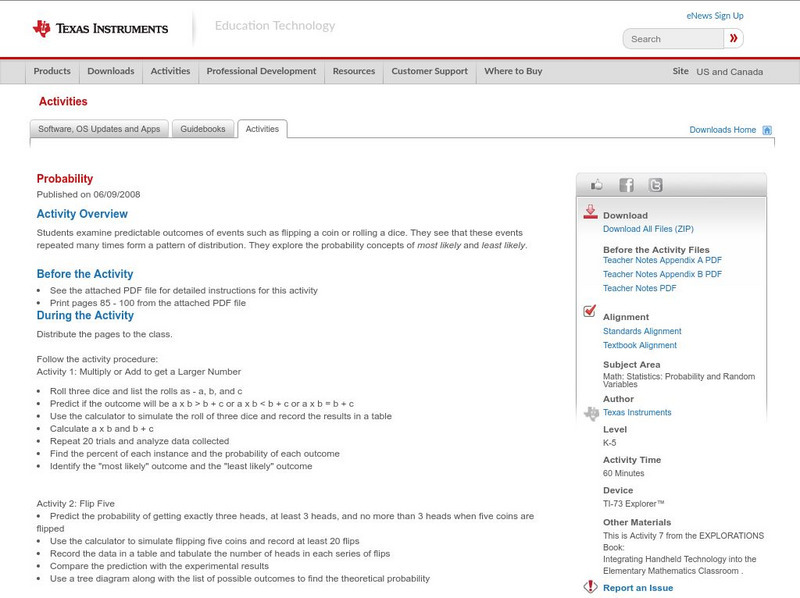Hi, what do you want to do?
Curated OER
Matching Pairs
Students examine the probability of the various findings in a game and determine the odds of winning. They differentiate between the facts of odds versus probability. Students use higher order thinking skills to explain how a problem is...
Curated OER
Coin Tossing
Sixth graders examine the use of probability and compare it to actual real world results. In groups, they flip a coin a specific number of times while their other group members roll a set of dice the same amount of times as the coin. To...
PBS
Remove One
With a set of 15 chips and a number line, learners predict what sums may occur with the rolling of two dice. When their sum comes up, they remove one of the chips from their number line with the objective of being the first to remove...
Curated OER
The Apple Blossom Problem
For this apple blossom problem, students examine a given situation in a board game. They determine the best way to win the game and the expected payoff. This one-page worksheet contains 1 problem.
EngageNY
Expected Value of a Discrete Random Variable
Discover how to calculate the expected value of a random variable. In the seventh installment of a 21-part module, young mathematicians develop the formula for expected value. They connect this concept the dot product of vectors.
EngageNY
Games of Chance and Expected Value 1
There's a strong chance that class members enjoy learning math through engaging games. Scholars analyze games of chance to determine long-term behavior. They learn to calculate expected value to help with this assessment.
Curated OER
What's the Matter? Locating Electrons in an Atom
Students roll dice in order to simulate the probability of locating an electron in a certain region around the nucleus.
Curated OER
Radon Alert: Understanding Odds
In this radon alert: understanding odds worksheet, 5th graders predict results of rolling dice and record data in a chart, then compare odds of events and occupations, then compare that with radon exposure.
Curated OER
What Are the Risks?
Middle schoolers use dice to determine the risk of being exposed to radon. They practice using new vocabulary related to probability and ratios. They make predictions about the results and record their observations.
Curated OER
Tree Diagrams
In this tree diagram instructional activity, students read story problems. From the given information, they draw tree diagrams to determine the total possible number of outcomes. This one-page instructional activity contains ten problems.
Curated OER
Counting Principle
In this counting principle worksheet, students solve 10 problems by applying the counting principle to each one. First, they determine the number of possible outcomes in a coin toss. Then, students the number of different cards with the...
Curated OER
Making Learning a Game
A game lesson can be a way to explore a variety of concepts with your students.
Curated OER
The Fair Factor
Students participate in playing many games to determine if they are fair or not. They create their own game that is fair to play with their classmates.
Curated OER
Number Sense
Eighth graders participate in a lesson that is concerned with reviewing basic math concepts using the four operations. The activity is composed of a math game that is played by them.
Beacon Learning Center
Beacon Learning Center: Lions, Tigers, and Probability
Students explore the probabilities of simple events, such as rolling a dice, in this interactive web lesson.
Mathigon
Mathigon: Probability and Discrete Math: Predicting the Future
This lesson focuses on probability theory for predicting the outcome of flipping a coin, and then flipping it multiple times.
Khan Academy
Khan Academy: Theoretical and Experimental Probability: Coin Flips and Die Rolls
A set of questions on experimental and theoretical probabilities using coins and dice. Answers are accompanied by explanations.
Illustrative Mathematics
Illustrative Mathematics: 7.sp.8 Tetrahedral Dice
Many games use dice which are six-sided and fair (meaning each face on the die is equally likely to land face up). Many games also use the sum of two dice rolled at the same time to determine movement of game pieces. However, not all...
Texas Instruments
Texas Instruments: Probability
Students examine predictable outcomes of events such as flipping a coin or rolling a dice. They see that these events repeated many times form a pattern of distribution. They explore the probability concepts of most likely and least likely.
Illustrative Mathematics
Illustrative Mathematics: 7.sp Rolling Dice
Roll two dice 10 times. After each roll, note whether any sixes were observed and record your results in the table below. Aligns with 7.SP.C.7.
University of Texas at Austin
Mathematics Teks Toolkit: Rolling Races
Students play a game by rolling dice and determining the probability of outcomes of colors.
Shodor Education Foundation
Shodor Interactivate: Racing Game With Two Dice
Simulate a game where "N" players roll two dice, and the lucky player has an advantage for reaching the finish.
National Council of Teachers of Mathematics
Nctm: Figure This: Are Dice Fair or Not?
Is it fair or not fair? That is the question. Try this math challenge where you use your probability and number sense skills to determine whether or not a game is fair. Find out how mastering this challenge can be useful in real life...
TED Talks
Ted: Ted Ed: The Last Banana: A Thought Experiment in Probability
Imagine a game played with two players and two dice: if the biggest number rolled is one, two, three, or four, player 1 wins. If the biggest number rolled is five or six, player 2 wins. Who has the best probability of winning the game?...
























